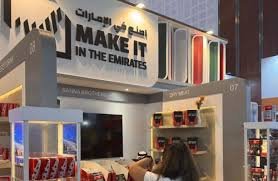By Maria Kalamatas | The Logistic News
June 10, 2025 – Section: Business / Conferences & Industry
Dubai – In the grand halls of Abu Dhabi’s Industrial Development Park, this year’s “Make It in the Emirates” conference brought together an ambitious mix of manufacturers, freight operators, aviation leaders, and policymakers—all focused on one thing: redefining how the UAE builds, moves, and scales its industrial output.
The conference, held under the patronage of the Ministry of Industry and Advanced Technology, emphasized the growing importance of logistics as both a strategic pillar and transformation catalyst. The UAE’s efforts to localize industrial capacity—particularly in sectors like aerospace, electronics, and medical supplies—are tightly linked to its ability to create fast, integrated, and digital supply networks.
“Logistics is no longer just a support function. It’s at the core of how we build national resilience,” said Fatima Al Dhaheri, Director of Supply Chain Strategy at Emirates Industrial Group. “We’re not just moving goods—we’re moving the future of production closer to home.”
A key theme was digitalisation. Delegates discussed AI-driven warehousing, blockchain traceability for shipments, and real-time customs integration across Gulf ports. Several Emirati startups unveiled logistics tech innovations aimed at reducing cross-border friction and lowering CO₂ per unit shipped.
The conference also served as a platform for new joint ventures. Emirates SkyCargo, DP World, and Etihad Rail each announced partnership initiatives to support multimodal expansion across the UAE and into broader MENA corridors. The focus: speed, sustainability, and strategic positioning.
“Dubai is not just a hub. It’s an ecosystem,” said French logistics executive Arnaud Boulard, who flew in to scout collaboration opportunities. “The region’s infrastructure, paired with the government’s industrial strategy, is building something few others can match in scale or pace.”
The UAE’s industrial ambitions are backed by tangible commitments: over $10 billion in investment pledged for logistics zones, bonded facilities, and automation hubs in 2025 alone. Plans are also underway to expand drone freight corridors and trial autonomous container handling at Jebel Ali Port.
While the Emirates has long been synonymous with trade, this year’s event confirmed that logistics is now a core driver of national competitiveness—not a back-office function. As global supply chains continue to fragment, Dubai is betting that those who own the infrastructure of movement will also shape the flow of commerce.
Maria Kalamatas
Senior Correspondent – Industry & Middle East Strategy
The Logistic News






















